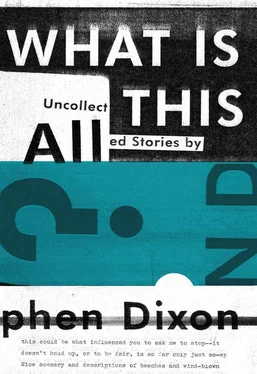Stephen Dixon - What Is All This? - Uncollected Stories
Здесь есть возможность читать онлайн «Stephen Dixon - What Is All This? - Uncollected Stories» весь текст электронной книги совершенно бесплатно (целиком полную версию без сокращений). В некоторых случаях можно слушать аудио, скачать через торрент в формате fb2 и присутствует краткое содержание. Год выпуска: 2010, Издательство: Fantagraphics, Жанр: Современная проза, на английском языке. Описание произведения, (предисловие) а так же отзывы посетителей доступны на портале библиотеки ЛибКат.
- Название:What Is All This?: Uncollected Stories
- Автор:
- Издательство:Fantagraphics
- Жанр:
- Год:2010
- ISBN:нет данных
- Рейтинг книги:3 / 5. Голосов: 1
-
Избранное:Добавить в избранное
- Отзывы:
-
Ваша оценка:
What Is All This?: Uncollected Stories: краткое содержание, описание и аннотация
Предлагаем к чтению аннотацию, описание, краткое содержание или предисловие (зависит от того, что написал сам автор книги «What Is All This?: Uncollected Stories»). Если вы не нашли необходимую информацию о книге — напишите в комментариях, мы постараемся отыскать её.
Stephen Dixon is also the literary world’s worst-kept secret. His witty, keenly observed narratives and sharply hewn prose have appeared in every major market magazine from
to
and have earned him two National Book Award nominations — for his novels
and
—a Guggenheim Fellowship, and the Pushcart Prize. He has also garnered the praise of critics and colleagues alike; Jonathan Lethem (
) even admits to “borrowing a jumpstart from a few lines of Dixon” in his own work. In all likelihood, many of the students who have passed through his creative writing classes at Johns Hopkins University have done the same.
Fantagraphics Books is proud to present his latest volume of short stories,
The tales in the collection are vintage Dixon, eschewing the modernism and quasi-autobiography of his
trilogy and instead treating us to a pared- down, crystalline style reminiscent of Hemingway at the height of his powers. Centrally concerning himself with the American condition, he explores obsessions of body image, the increasingly polarized political landscape, sex — in all its incarnations — and the gloriously pointless minutiae of modern life, from bus rides to tying shoelaces.
Dixon’s stories are crafted with the eye of a great observer and the tongue of a profound humorist, finding a voice for the modern age in the same way that Kafka and Sartre captured the spirit of their respective epochs. using the canvas of his native New York (with one significant exception that affords Dixon the opportunity to create a furiously political fable) he astutely captures the edgy madness that infects the city through the neuroses of his narrators with a style that owes as much to Neo-Realist cinema as it does to modern literature. is an immense, vastly entertaining, and stunningly designed collection, that will delight lovers of modern fiction and serve as both an ideal introduction to this unique voice and a tribute to a great American writer.
What Is All This?













